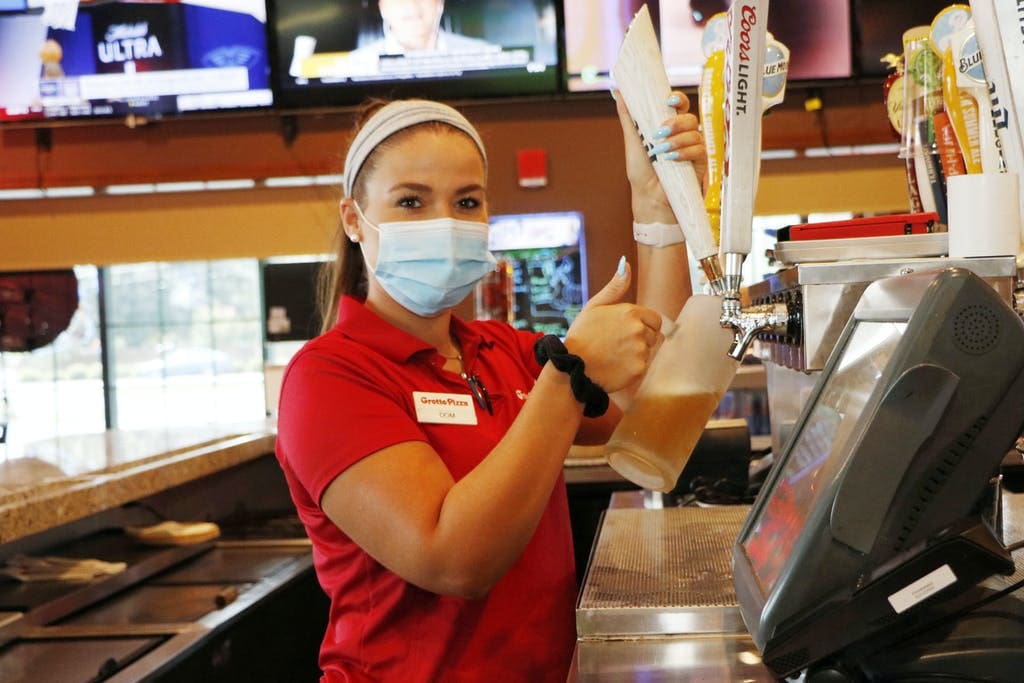
Grotto Pizza is taking advantage of free human resources classes paid for by the state’s rapid retraining program.
The University of Delaware is offering free classes to those currently employed in or interested in restaurant management and hospitality.
The 8-week course is intended to teach better human resources skills in the restaurant setting.
“I think anyone who learns a career should take an HR class,” said Lauren Bigelow, 34, who works in marketing at Thompson Island Brewing Co. “A lot of this stuff gets lost in smaller businesses who don’t have an HR department.”
Upon completion of the course graduates receive a certification in executive education and two credits in executive education at UD.
The only requirement to qualify for the class is to be a resident of Delaware.
Error, group does not exist! Check your syntax! (ID: 11)
Interested applicants should contact Karen Stauffer of the Delaware Restaurant Association at [email protected]
The class, entitled “Human resources competencies for restaurant managers” has two separate class groups. The first, made up of 30 people, began on Jan. 19 and will last 8 weeks. The second begins on Feb. 16 and ends on April 13.
The first group is still on its first module.
“Right now, is all about workplace law. I’m very familiar with this module. It’s what I’m doing all the time,” said Glenn Byrum, 39, director of HR at Grotto Pizza. “I’m really looking forward to the modules ahead. They deal with some stuff that’s a little bit outside my job.”
Hospitality Associated for Research & Training (HART), a UD organization that put together the education program, is actively seeking to fill seats for the second group.
Error, group does not exist! Check your syntax! (ID: 11)
The class is taught completely online through Canvas and Zoom.
The program was put together by the Delaware Restaurant Association, the Delaware Department of Labor and the university.
The classes are paid for by the state rapid workforce training plan with CARES Act money. It was put in place to rebuild and reinforce Delaware’s economy during and after the COVID-19 pandemic. The program provides training for healthcare, construction, food service, transportation and IT.
The human resources course is taught by HART director Ali Poorani, Adjunct Law Professor Katherine Witherspoon Fry and HR professional Rosanne Sawyer, who will focus on the practical and the legal sides of human resources.
“The pandemic closed business; some restaurants closed forever,” said Poorani. “One of the upsides of that is that society understood how important restaurants are. They understood that restaurants have a purpose and that they provide an experience to friends and families.”
Error, group does not exist! Check your syntax! (ID: 11)
Part of the course involves teaching students the importance of providing an experience in the restaurant, which involves creating a safe and healthy environment for employees and a culture for the costumers to enjoy.
The final project for the students in the class is to plan a change for a business of their choice, something restaurants have had to do a lot in the last year whether it was implementing touchless payment/menus, converting part of their business to curbside pickup or utilizing third party delivery services.
“Our goal is to upgrade the skills of people, how they can manage change,” Poorani said. “If they want to bring in more costumers they will need to learn how to change.”
One big issue that Poorani sees in the restaurant industry is the rift between franchised restaurants and small businesses when it comes to human resources.
Error, group does not exist! Check your syntax! (ID: 11)
Major franchises, such as Applebee’s and Outback Steakhouse, tend to have human resource support locally or on a corporate level. Conversely, local businesses tend to not have a human resources department or give the job to someone who already has a different job.
“They have support staff but no HR,” Poorani said. “One example from our most recent class was someone in the accounting position was recently asked to pick up human recourse duties.”
Restaurant managers are often put in the position of human resources officers.
“It’s important for managers to be able to handle HR responsibilities,” Poorani said. “Nearly 70% of what frontline managers deal with is employee and HR issues.”


Betsy Price is a Wilmington freelance writer who has 40 years of experience.
Share this Post








